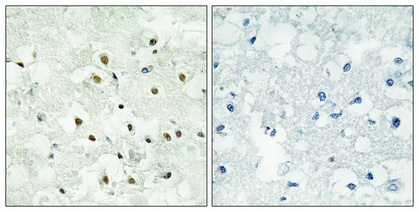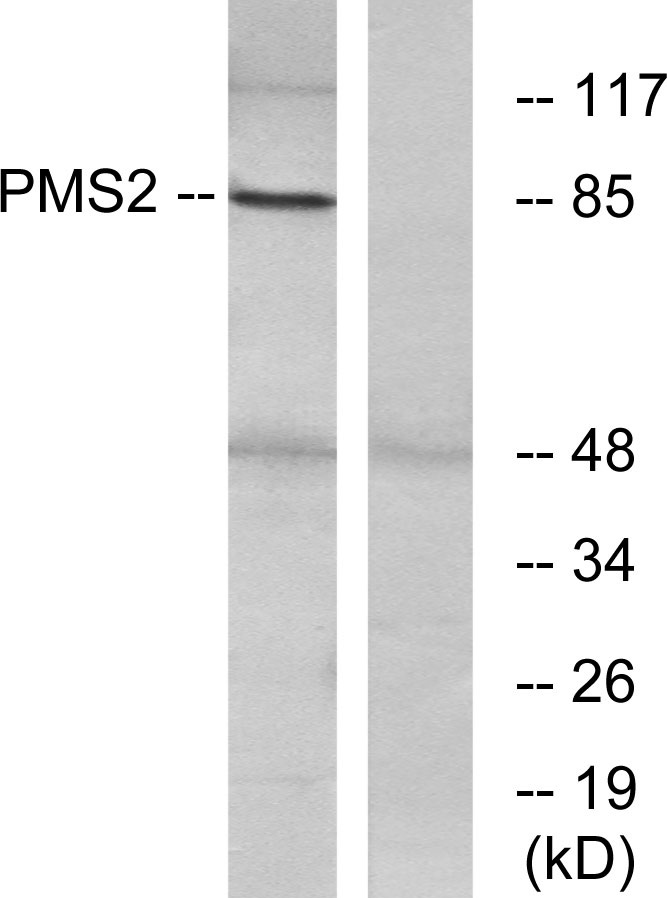PMS2 Polyclonal Antibody
- Catalog No.:YT3804
- Applications:WB;IHC;IF;ELISA
- Reactivity:Human;Mouse
- Target:
- PMS2
- Fields:
- >>Mismatch repair;>>Fanconi anemia pathway
- Gene Name:
- PMS2
- Protein Name:
- Mismatch repair endonuclease PMS2
- Human Gene Id:
- 5395
- Human Swiss Prot No:
- P54278
- Mouse Swiss Prot No:
- P54279
- Immunogen:
- The antiserum was produced against synthesized peptide derived from human PMS2. AA range:461-510
- Specificity:
- PMS2 Polyclonal Antibody detects endogenous levels of PMS2 protein.
- Formulation:
- Liquid in PBS containing 50% glycerol, 0.5% BSA and 0.02% sodium azide.
- Source:
- Polyclonal, Rabbit,IgG
- Dilution:
- WB 1:500 - 1:2000. IHC 1:100 - 1:300. IF 1:200 - 1:1000. ELISA: 1:10000. Not yet tested in other applications.
- Purification:
- The antibody was affinity-purified from rabbit antiserum by affinity-chromatography using epitope-specific immunogen.
- Concentration:
- 1 mg/ml
- Storage Stability:
- -15°C to -25°C/1 year(Do not lower than -25°C)
- Other Name:
- PMS2;PMSL2;Mismatch repair endonuclease PMS2;DNA mismatch repair protein PMS2;PMS1 protein homolog 2
- Observed Band(KD):
- 85kD
- Background:
- The protein encoded by this gene is a key component of the mismatch repair system that functions to correct DNA mismatches and small insertions and deletions that can occur during DNA replication and homologous recombination. This protein forms heterodimers with the gene product of the mutL homolog 1 (MLH1) gene to form the MutL-alpha heterodimer. The MutL-alpha heterodimer possesses an endonucleolytic activity that is activated following recognition of mismatches and insertion/deletion loops by the MutS-alpha and MutS-beta heterodimers, and is necessary for removal of the mismatched DNA. There is a DQHA(X)2E(X)4E motif found at the C-terminus of the protein encoded by this gene that forms part of the active site of the nuclease. Mutations in this gene have been associated with hereditary nonpolyposis colorectal cancer (HNPCC; also known as Lynch syndrome) and Turcot syndrome
- Function:
- disease:Defects in PMS2 are a cause of mismatch repair cancer syndrome (MMRCS) [MIM:276300]; also known as Turcot syndrome and brain tumor-polyposis syndrome 1 (BTPS1). MMRCS is an autosomal dominant disorder characterized by malignant tumors of the brain associated with multiple colorectal adenomas. Skin features include sebaceous cysts, hyperpigmented and cafe au lait spots.,disease:Defects in PMS2 are the cause of hereditary non-polyposis colorectal cancer type 4 (HNPCC4) [MIM:600259]. Mutations in more than one gene locus can be involved alone or in combination in the production of the HNPCC phenotype (also called Lynch syndrome). Most families with clinically recognized HNPCC have mutations in either MLH1 or MSH2 genes. HNPCC is an autosomal, dominantly inherited disease associated with marked increase in cancer susceptibility. It is characterized by a familial predisposition to ear
- Subcellular Location:
- Nucleus .
- Expression:
- Amygdala,Brain,Endometrial tumor,Epithelium,Human endometri
- June 19-2018
- WESTERN IMMUNOBLOTTING PROTOCOL
- June 19-2018
- IMMUNOHISTOCHEMISTRY-PARAFFIN PROTOCOL
- June 19-2018
- IMMUNOFLUORESCENCE PROTOCOL
- September 08-2020
- FLOW-CYTOMEYRT-PROTOCOL
- May 20-2022
- Cell-Based ELISA│解您多样本WB检测之困扰
- July 13-2018
- CELL-BASED-ELISA-PROTOCOL-FOR-ACETYL-PROTEIN
- July 13-2018
- CELL-BASED-ELISA-PROTOCOL-FOR-PHOSPHO-PROTEIN
- July 13-2018
- Antibody-FAQs
- Products Images

- Western Blot analysis of various cells using PMS2 Polyclonal Antibody cells nucleus extracted by Minute TM Cytoplasmic and Nuclear Fractionation kit (SC-003,Inventbiotech,MN,USA).

- Immunohistochemical analysis of paraffin-embedded Human brain. Antibody was diluted at 1:100(4° overnight). High-pressure and temperature Tris-EDTA,pH8.0 was used for antigen retrieval. Negetive contrl (right) obtaned from antibody was pre-absorbed by immunogen peptide.

- Western blot analysis of lysates from HeLa cells, using PMS2 Antibody. The lane on the right is blocked with the synthesized peptide.



